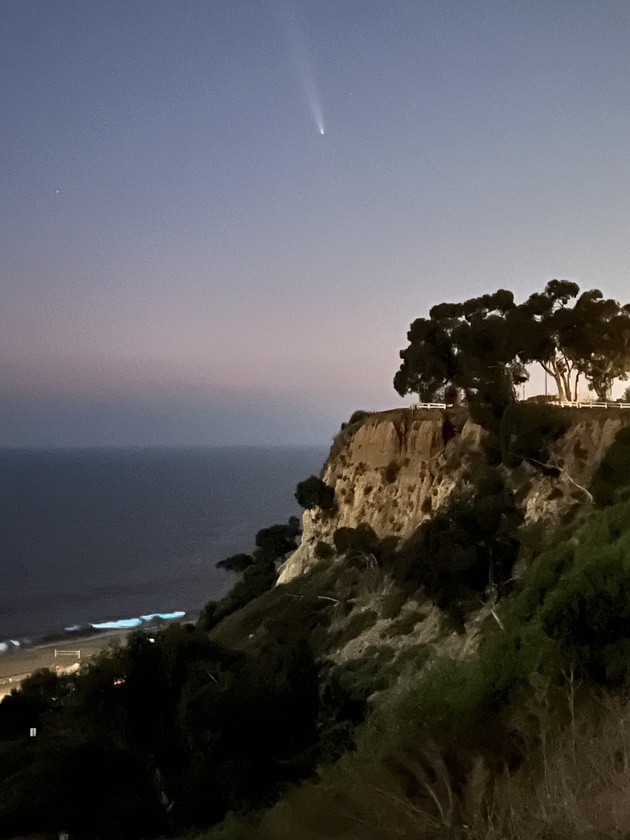Last night I took my eldest daughter to see a newly-discovered comet, C/2023 A3 (Tsuchinshan–ATLAS), just after sunset. I would not have known about it except I happened to catch a random news bulletin on the radio (random because my car radio is malfunctioning -- a story for another time).
The timing was perfect, since we were coming back from her band practice. According to the news report, one had to look west about 45 minutes after sunset. We chose the Pacific Palisades bluffs, which have a clear view over the ocean from about 200 feet above the beach and Pacific Coast Highway.
We could not have anticipated the beauty of the setting -- nor what happened next. My daughter exclaimed: "There's neon in the water!" And sure enough, when the waves crashed, they were bioluminescent. That's rare enough -- the last time we saw that here was almost five years ago -- but with a comet!
The images I managed to capture on my iPhone were incredible. Interestingly, the comet was discovered by astronomers in China and South Africa, and I've actually been to the telescope in South Africa. It's near a remote town in the Karoo desert called Sutherland, a place spectacular in its stark beauty.

This week’s portion launches the great story of Abraham, who is told to leave everything of his life behind — except his immediate family — and to leave for “the Land that I shall show you.”
There’s something interesting in the fact that Abraham is told to leave his father’s house, as if breaking away from his father’s life — but his father, in fact, began the journey, moving from Ur to Haran (in last week’s portion). His father set a positive example — why should Abraham leave him?
Some obvious answers suggest themselves — adulthood, needing to make one’s own choices, his father not going far enough, etc.
But I think there is another answer. Abraham (known for the moment as Abram) needs to establish his own household. This is not just about making one’s own choice, but really about choosing one’s own starting point. It’s starting over.
Sometimes we start over in fundamental ways even if much that surrounds us remains the same. Sometimes the journey we have to ...
The story of Noah is familiar; the details, less so.
Noah is often seen as an ambivalent figure. He was righteous -- but only for his generation. What was his deficiency?
One answer suggests itself: knowing that the world was about to be flooded, he built an Ark for the animals and for his own family -- but did not try to save anyone else or to convince them to repent and change their ways (the prophet Jonah, later, would share that reluctance).
Abraham, later, would set himself apart by arguing with God -- with the Lord Himself! -- against the destruction of Sodom and Gomorrah, saying that they should be saved if there were enough righteous people to be found (there were not).
Still, Noah was good enough -- and sometimes, that really is sufficient to save the world. We don't need heroes every time -- just ordinary decency.
Hi all -- as I noted last month, I'm going to be closing down my Locals page, at least for tips and subscriptions -- I may keep the page up and the posts as well, but I'm no longer going to be accepting any kind of payment.
Look for cancelation in the very near future. Thank you for your support!












